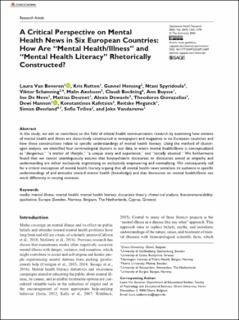| dc.contributor.author | Van Beveren, Laura | |
| dc.contributor.author | Rutten, Kris | |
| dc.contributor.author | Hensing, Gunnel | |
| dc.contributor.author | Spyridoula, Ntani | |
| dc.contributor.author | Schønning, Viktor | |
| dc.contributor.author | Axelsson, Malin | |
| dc.contributor.author | Bockting, Claudi | |
| dc.contributor.author | Buysse, Ann | |
| dc.contributor.author | de Neve, Ine | |
| dc.contributor.author | Desmet, Mattias | |
| dc.contributor.author | Dewaele, Alexis | |
| dc.contributor.author | Giovazolias, Theodoros | |
| dc.contributor.author | Hannon, Dewi | |
| dc.contributor.author | Kafetsios, Konstantinos | |
| dc.contributor.author | Meganck, Reitske | |
| dc.contributor.author | Øverland, Simon Nygaard | |
| dc.contributor.author | Triliva, Sofia | |
| dc.contributor.author | Vandamme, Joke | |
| dc.date.accessioned | 2021-05-10T10:44:16Z | |
| dc.date.available | 2021-05-10T10:44:16Z | |
| dc.date.created | 2021-01-21T16:10:40Z | |
| dc.date.issued | 2020 | |
| dc.Published | Qualitative Health Research. 2020, 30 (9), 1362-1378. | |
| dc.identifier.issn | 1049-7323 | |
| dc.identifier.uri | https://hdl.handle.net/11250/2754610 | |
| dc.description.abstract | In this study, we aim to contribute to the field of critical health communication research by examining how notions of mental health and illness are discursively constructed in newspapers and magazines in six European countries and how these constructions relate to specific understandings of mental health literacy. Using the method of cluster-agon analysis, we identified four terminological clusters in our data, in which mental health/illness is conceptualized as “dangerous,” “a matter of lifestyle,” “a unique story and experience,” and “socially situated.” We furthermore found that we cannot unambiguously assume that biopsychiatric discourses or discourses aimed at empathy and understanding are either exclusively stigmatizing or exclusively empowering and normalizing. We consequently call for a critical conception of mental health literacy arguing that all mental health news socializes its audience in specific understandings of and attitudes toward mental health (knowledge) and that discourses on mental health/illness can work differently in varying contexts. | en_US |
| dc.language.iso | eng | en_US |
| dc.publisher | SAGE Publications | en_US |
| dc.rights | Navngivelse-Ikkekommersiell 4.0 Internasjonal | * |
| dc.rights.uri | http://creativecommons.org/licenses/by-nc/4.0/deed.no | * |
| dc.title | A Critical Perspective on Mental Health News in Six European Countries: How Are “Mental Health/Illness” and “Mental Health Literacy” Rhetorically Constructed? | en_US |
| dc.type | Journal article | en_US |
| dc.type | Peer reviewed | en_US |
| dc.description.version | publishedVersion | en_US |
| dc.rights.holder | Copyright The Author(s) 2020 | en_US |
| cristin.ispublished | true | |
| cristin.fulltext | original | |
| cristin.qualitycode | 2 | |
| dc.identifier.doi | 10.1177/1049732320912409 | |
| dc.identifier.cristin | 1876758 | |
| dc.source.journal | Qualitative Health Research | en_US |
| dc.source.40 | 30 | |
| dc.source.14 | 9 | |
| dc.source.pagenumber | 1362-1378 | en_US |
| dc.relation.project | EU/PP-2- 2016 | en_US |
| dc.identifier.citation | Qualitative Health Research. 2020, 30 (9), 1362-1378. | en_US |
| dc.source.volume | 30 | en_US |
| dc.source.issue | 9 | en_US |

